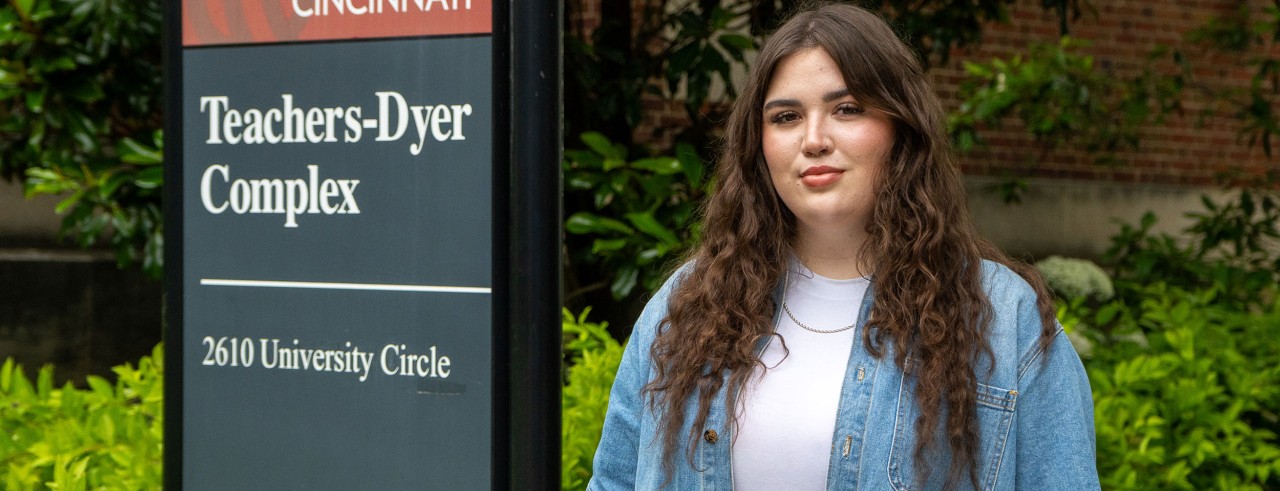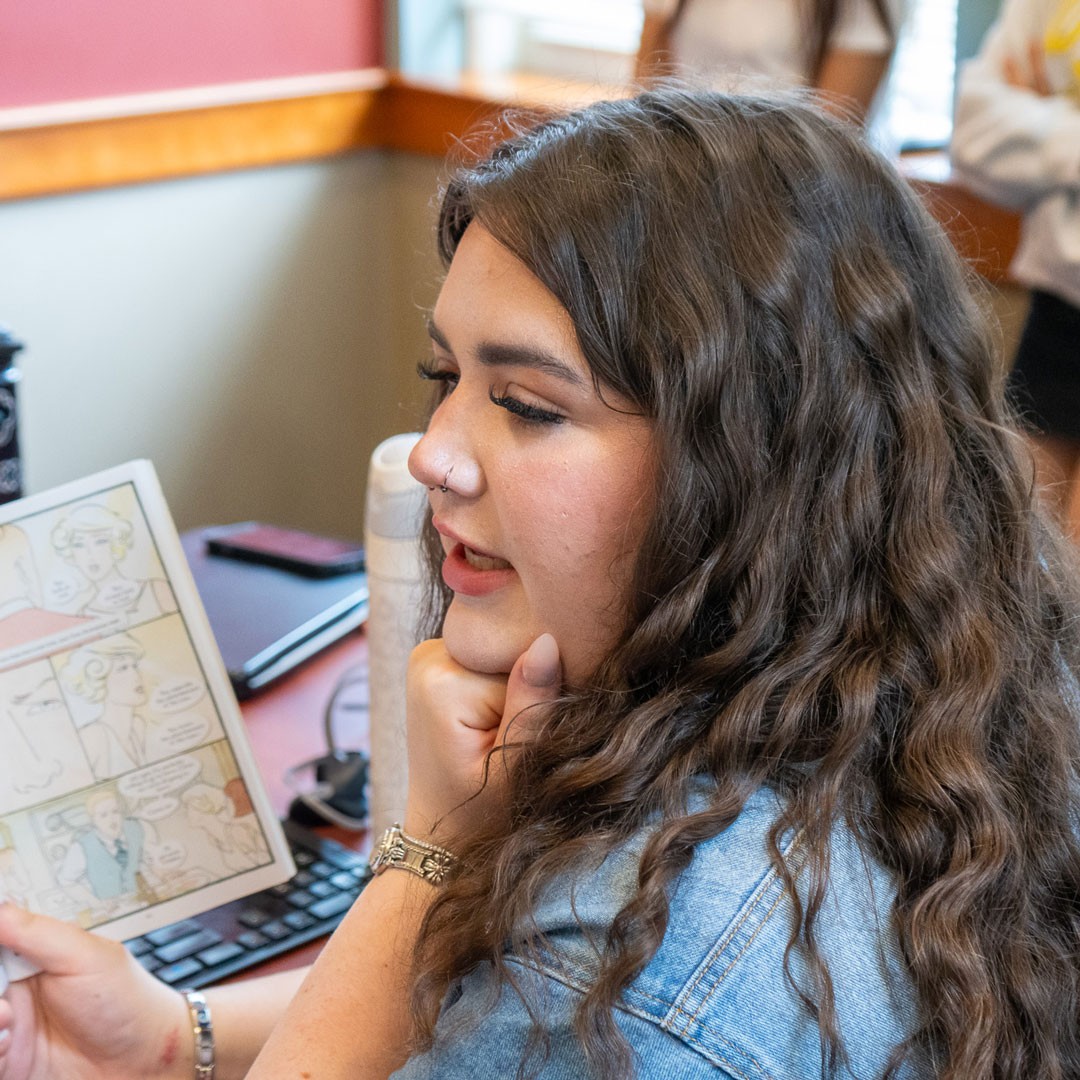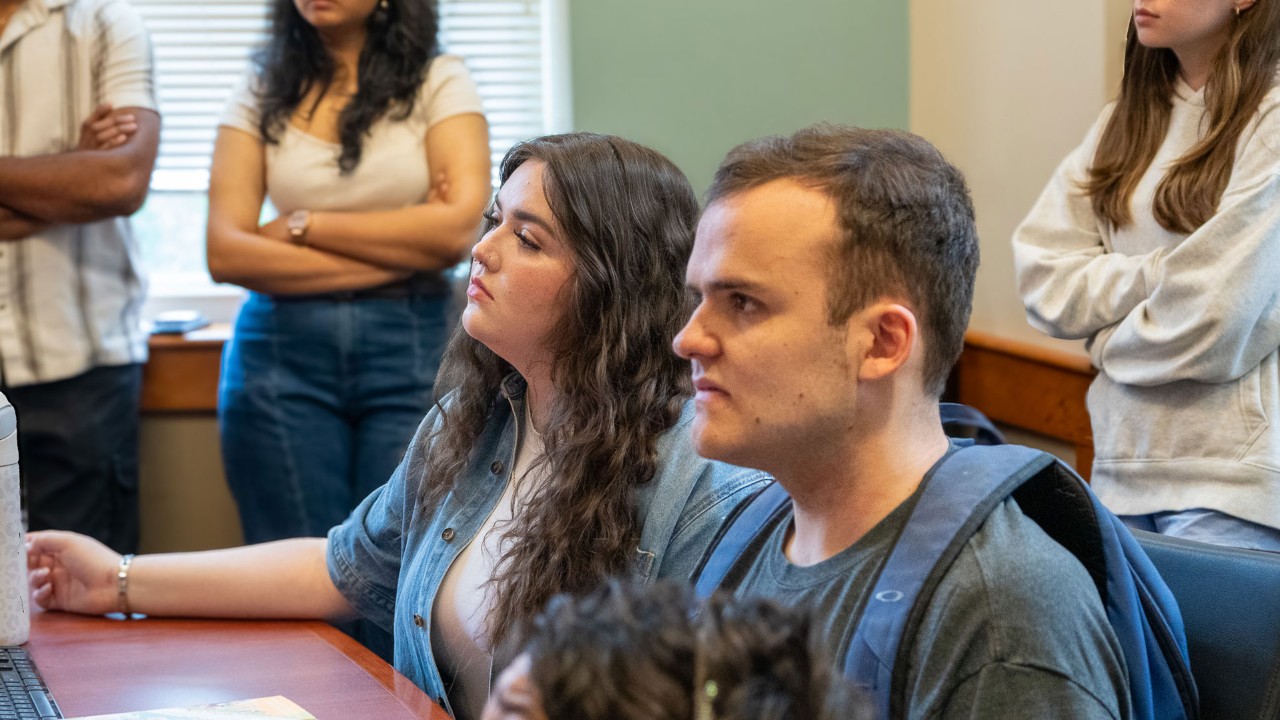
UC student Jaysa Kleiber leads the way with IDD research
The Special Education major serves as primary facilitator on an IDD Education Center intervention
Jaysa Kleiber always knew she wanted to pursue a career in special education thanks to opportunities and experiences provided by her hometown high school in Mason.
"They have a teacher program there that I was able to join, knowing that I wanted to go into education. I was given the opportunity to aid in a bunch of classrooms and build relationships with a lot of the special educators," Kleiber said. "I was able to get hours and experience in a classroom throughout the day."

Jaysa Kleiber gets hands-on experience in the classroom. Photo by Daniel Johnson, CECH Marketing
When it was time to choose a university, Kleiber found what she was looking for close to home at the University of Cincinnati, whose School of Education, which is part of the College of Education, Criminal Justice, Human Services, and Information Technology, presented a number of attractive options that led Kleiber to enroll.
"I did a lot of research and they offered a bunch of different opportunities," she said. "I took so many different classes that I never would have thought to take, like American Sign Language. We looked into deaf culture and explored things like Gothic studies to look at how people with disabilities were treated then versus now."
She also pointed to working with educators at the Warren County Educational Service Center, one of her favorite undergraduate experiences, as especially formative. "We each had a specific student we were assigned to," she said. "We were working on literacy skills and functional skills, and it was so impactful."
An innovative intervention
Kleiber's role in an ongoing research project with the School of Education’s Intellectual and Developmental Disability (IDD) Education Center, which provides programs for teens and adults with IDD to further their education, independence and life skills, is shaping up to be one of the biggest opportunities she’s had yet.
"I was asked by Christina Carnahan to be a researcher," Kleiber said. "What I did was collect data based off a communication class focusing on Facebook."
Genna Kieper, director of the IDD Educations Center's IMPACT Innovation program, added that working with social media provides a number of benefits to the Center's associates. "We selected Facebook as our medium not only to cultivate digital literacy skills, but also to create a space where IMPACT families and staff can meaningfully connect with our associates as they reflect on and share their daily lives," Kieper said. "This collaborative setting not only enables participants to express themselves publicly via social media, but also fosters direct peer-to-peer communication, enriching their social interactions and sense of community."
Kleiber said the class worked with the Center’s associates to explore the baseline of communication. Through collecting photos of daily activities and building sentences to share experiences, they can share their experiences in social media posts.

Kleiber listens in a classroom as part of her special education program. Photo by Daniel Johnson, CECH Marketing
"We're right now working on entering phase three of the research study," Kleiber said.
"We're now going to be posting on social media versus just exploring that baseline of communication and the motor skills of figuring out the complexity of finding a photo and building the sentence."
"I really enjoy how the focus is trying to get these individuals to have experiences like anyone else," Kleiber said. "Showing experiences through using vocabulary has been very beneficial, not only for the associates that I work with, but also for me learning how to instruct in that way."
Taking the lead
Kleiber recently became the study's primary facilitator, leading the transition from instruction-based research to creating and posting social media content. She said that her long-term aim is to determine the feasibility of implementing techniques used in the study in other day programs for individuals with IDD. "It's provided me with more experience working with adults with disabilities, which is a lot different than working with younger students with disabilities," Kleiber said.
Kieper emphasized that Kleiber's leadership has been a great addition to the project. "Jaysa consistently demonstrates a remarkable ability to translate the knowledge and strategies gained from her teacher preparation courses into impactful, well-structured sessions each week," Kieper said. "She invests considerable effort in fostering meaningful engagement with both IMPACT associates and our student support staff, ensuring that every interaction is purposeful and inclusive."
The experience has also provided Kleiber with insight into how she’ll approach her future career as an intervention specialist, as some parallels with potential classroom scenarios have become clearer. "It definitely helps in thinking about when I will have my own classroom, because the research is focused on small groups," she explained. "We have different groups based off their communication needs. It's been very beneficial to see all these different types of communication needs all in one setting, as I will have in my own classroom one day with students with different needs."
She also plans to pursue a master’s degree in the future, potentially in educational leadership, and says she could see herself one day working toward becoming a Board Certified Behavior Analyst. For now, though, she’s excited about her senior year, during which she will be student teaching through a new paid pathway program at UC that will allow her to substitute teach at various schools.
"I’ll get more experience and get to see a lot of different things as opposed to being in the same classroom every day," she said.
Featured image at top: Jaysa Kleiber stands beside a sign for the Teachers-Dyer Complex at UC. Photo by Daniel Johnson, CECH Marketing
School of Education
UC's School of Education – part of the College of Education, Criminal Justice, Human Services, and Information Technology – is highly regarded for preparing the next generation of educators. The program is led by a team of experienced and qualified faculty who are dedicated to teaching students to meet the demands of modern classrooms and address the educational needs of student populations. The program offers a variety of courses and experiences that will help students develop their understanding of child development, instructional methods and classroom management.
Related Stories
UC studies supplement, therapy alternatives to treat depression
March 2, 2026
Media outlets including Cleveland.com and Cleveland's WKYC News highlighted a new University of Cincinnati clinical trial funded by an approximately $3.5 million grant from the National Institutes of Health’s National Center for Complementary and Integrative Health to test two new nonpharmacological treatments for teens and young adults with depression.
Did plants nearly wipe out all marine life on Earth — twice?
March 2, 2026
An expert on global mass extinctions at the University of Cincinnati provided context to a new study examining the spread of the first land plants on Earth between 360 million and 540 million years ago.
'Paradigm-shifting' study confirms effectiveness of long-acting HIV treatment
February 26, 2026
The results of a clinical trial involving the University of Cincinnati, recently published in The New England Journal of Medicine, show people failing HIV treatments with oral medications were able to be treated successfully using injections.
